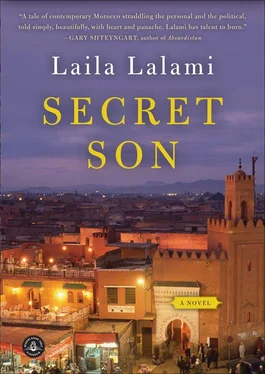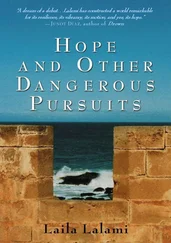“I’m sure. Thanks.” He smiled and, with a little wave of the hand, turned around and walked off.
Nabil stood, keys in hand, watching Youssef walk away, gripped with a sudden fear that this son who had magically appeared in his life would just as magically disappear from it; that he would do what Amal had done and turn his back on his father. It was not coincidence that had brought him. What happened today was a sign. Nabil had been given another chance, and he resolved then not to make the mistake of letting his son slip through his hands the way he had his daughter.
THE FIRST TIME YOUSSEF walked into the lobby of the AmraCo building and asked to see Nabil Amrani, he was told that Monsieur le Directeur was in Paris. The second time, Monsieur le Directeur was at the bus depot in Aïn Sebaa. The third and fourth times, he was taking part in a business conference downtown. The fifth time, he was in a meeting whose duration could not be predicted; it was not until 6 p.m., when the night watchman arrived, that Youssef had gone home, only to return early the next day. His persistence annoyed Mr. Amrani’s assistant: he could hear her screaming as the front-desk clerk held the receiver away from his ear. He was nearly depleted of courage and energy when, on the seventh day, he was told he could have five minutes with Mr. Amrani.
He took the elevator up to the eighth floor. With barely a glance in his direction, Nabil Amrani’s assistant pointed to a leather sofa across from her desk. He sat down quietly. On the wall to his right was a poster of a pristine beach, with a handsome European couple frolicking in the surf. A large caption read: MOROCCO: DISCOVER THE MAGIC. Keeping her eyes on her computer screen, the assistant typed without pause. He waited for more than half an hour, alternately shifting his gaze from the sandy beach to the assistant. Suddenly, Nabil Amrani spoke through the loudspeaker on her desk. “Send him in, Fadila.”
Youssef didn’t move. A part of him wanted to run in; the other, to run out.
“Are you deaf?” Fadila asked irritably. “Go in now. He’s ready to see you.” She walked to the inner door and opened it wide.
The moment had come. To stand in front of the father he had never known, hear the timbre of his voice for the first time, watch his face for signs of resemblance — all this made it difficult to speak. Nabil had the same complexion, blue eyes, and wavy hair as Youssef, but he also had the yellow teeth and purple lips of a heavy smoker, a potbelly that indicated a love of beer or food, or both, and a disorderly appearance, as if he had been interrupted in the middle of a private moment. Along with the inevitable disappointment that results when reality collides with dreams, Youssef noticed something unexpected: the complete despair in his father’s eyes. It made Youssef want to reach out and touch him. But as he took a few steps inside the room, his father’s expression of despair gradually changed, replaced by barely contained impatience. He felt so out of place in this well-appointed office, and so disconcerted by that look, that he couldn’t help being distant. As he extended his hand, he gazed at his father coolly.
“How are you?” Nabil said mechanically.
“Je vais très bien, merci.”
A fleeting expression of surprise passed on his father’s face. This was exactly what he had feared — his father had already judged him without knowing anything about him.
“What can I do for you?”
“I am not here to ask for a favor.” On the desk between them were several silver-framed photographs. One showed a middle-aged woman, presumably Nabil’s wife, wearing a burgundy caftan and a wide gold belt, but all the others showed a girl at various ages: as a young child in a blue gingham dress, smiling widely to display missing milk teeth; as a teenager, looking moodily at the camera, over a book she was reading; as a young woman, wearing a black dress and holding her father by the arm at a reception. It surprised Youssef how pleased he was that the girl (his sister? Yes, of course, it had to be his sister) looked more like her mother, while he resembled his father.
“Then what are you here for?” Nabil said, his voice barely above a whisper.
A sudden sense of propriety descended on Youssef. He was too embarrassed to explain who he was: the forgotten bastard child. The words refused to come out. “I think you know,” he said at last. That did not seem to help. Nabil raised quizzical eyebrows but did not speak. Youssef whispered, “I am your son.”
Nabil’s face lit with genuine surprise.
He doesn’t know? Youssef thought. That was impossible. How could he not know?
“I think we should talk about this outside.”
Even in his disappointment, Youssef could not help noticing how similar his father’s reaction was to his mother’s, and to his own. She had kept the secret of his birth for almost his entire life. He himself had disguised the truth once he had learned it. Now that the time had come for his father to confront it, his first reaction was to get out of the office, to take Youssef away from the eyes of others.
The sight of Nabil before him, so comfortable, so confident, so clearly used to having the world go his way, unlocked something deep in Youssef, and when it opened, it demanded that he do something — anything. So when his father turned around to get his suit jacket, Youssef grabbed a star-shaped silver paperweight from the desk and slipped it into his pocket. He had never stolen anything, and immediately regretted it. He would have to put it back, but his father now looked directly at him, gesturing toward the door. The paperweight felt heavy in Youssef’s pocket, weighing him down as he went with his father down the hallway, down the elevator, down the street.

Youssef was used to the neighborhood stalls where young men like him gathered to eat fried sardines or roasted chickpeas, and to the cafés where they drank tea and played cards, but he had never been inside a place where the waiters’ jackets were not threadbare, where the food trays were not cracked, and where music did not blare out of the loudspeakers. At La Mouette, even the air was different. This could have been my life, he thought. This should have been my life. As soon as they were seated, his father leaned in and asked, “How did you find me?”
Youssef peered at him over his menu, unsurprised that this was the first question on Nabil Amrani’s mind. His father knew all about him; his earlier expression of surprise had been nothing more than an act. “The phone book,” he said. He went back to reading the seafood specials. Those prices — did people really pay this much for a meal?
The waiter came to take their orders, bending obsequiously as he wrote down what Nabil Amrani wanted. He kept saying “N’am a-sidi” every time he had a chance. When his turn came, Youssef ordered the most expensive item on the menu. Because Nabil asked him how old he was, Youssef felt it appropriate to ask a few questions of his own. “How old are you?”
“Forty-nine.”
His father had been thirty when he had gotten his mother pregnant. Could he not have acted like the grown man he was and taken responsibility for his actions?
“The picture on your desk — that’s your daughter?”
Nabil nodded. “Amal.”
“And how old is she?”
“Twenty.”
“Twenty?” he repeated, incredulously. His mother had told him that she and his father had planned on getting married; she had never mentioned that he was already married — or that he had a child.
“And a half. She turned twenty in January.”
Читать дальше













